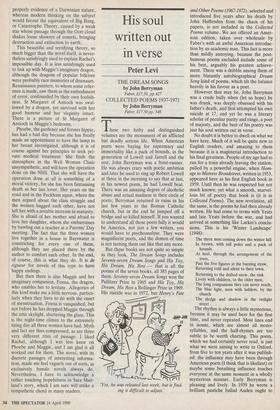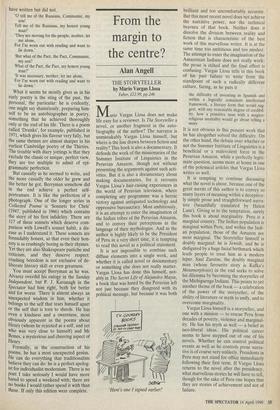His soul written out in verse
Peter Levi
THE DREAM SONGS by John Berryman Faber, £17.50, pp.427 COLLECTED POEMS 1937-1971 by John Berryman Faber, 07.50 pp. 348 These two hefty and distinguished volumes are the monument of an afflicted but deadly serious life. When American poets were baying for supremacy and immortality like a pack of hounds, in the generation of Lowell and Jarrell and the rest, John Berryman was a front-runner. He was always crazy with poetic ambition and later he used to ring up Robert Lowell at three in the morning to say that at last, in his newest poem, he had Lowell beat. There was an amazing degree of alcoholic abuse and actual madness in their circle of poets; Berryman returned in ruins in his last few years to the Roman Catholic church, but in the end he jumped off a bridge and so killed himself. If you wanted to understand all these poets fully it would be America, not just a few writers, you would have to psychoanalyse. They were magnificent poets, and the demon of time is not turning them out like that any more.
But these books are not quite so simple as they look. The Dream Songs includes Seventy-seven Dream Songs and His Toy, His Dream, His Rest — that is all the poems of the seven books, all 385 pages of them. Seventy-seven Dream Songs won the Pullitzer Prize in 1965 and His Toy, His Dream, His Rest a Bollinger Prize in 1969.
His suicide was in 1972, but Henry's Fate `Yes, he was released last week, but is find- ing it difficult to adjust.' and Other Poems (1967-1972), selected and introduced five years after his death by John Haffenden from the chaos of his papers, is not included in the Collected Poems volume. We are offered an Amer- ican edition, taken over wholesale by Faber's with an awful American introduc- tion by an academic man. This fact is more than mildly annoying, because the post- humous poems excluded include some of his best, arguably his greatest achieve- ment. There was a dribble among them of more blatantly autobiographical Dream Song kind of poems, which tilt the balance heavily in his favour as a poet.
However that may be, John Berryman was a crude bully when (let us hope) he was drunk, was deeply obsessed with his father's death, and first attempted his own suicide at 17, and yet he was a literary scholar of peculiar purity and range, a poet of majesty, and the best of his poetry was just his soul written out in verse.
No doubt it is better to dwell on what we have here. Much of it will be quite new to English readers, and amazing to them because it is a magisterial introduction to his final greatness. People of my age had to run for a train already leaving the station, pulled by a powerful engine, when Hom- age to Mistress Broadstreet, written in 1953, appeared here as his first English book in 1959. Until then he was respected but not much known: yet what a smooth, marvel- lous bit of poetry that book is (it is in Collected Poems). The new revelation, all the same, is the poems he had then already written. He had come to terms with Yeats and late Yeats before the war, and had arrived at something like Larkin's conclu- sions. This is his 'Winter Landscape' (1948):
The three men coming down the winter hill In brown, with tall poles and a pack of hounds At heel, through the arrangement of the trees, Past the five figures at the burning straw, Returning cold and silent to their town.
Returning to the drifted snow, the rink Lively with children, to the older men, The long companions they can never reach, The blue light, men with ladders, by the church The sledge and shadow in the twilight street . . .
The rhythm is always a little mysterious, because it may be used here for the first time, and never repeated. Most lines end in nouns, which are almost all mono- syllables, and the half-rhymes are too subtle to be worth charting. This poem, which we had certainly never read, is just what we were aiming to write in Oxford, from five to ten years after it was publish- ed: the influence may have been through American poets (I think that is likeliest) or maybe some breathing influence touches everyone at the same moment in a wholly mysterious manner. Early Berryman is pleasing and lively. In 1939 he wrote a brilliant pastiche ballad Auden ought to have written but did not.
`0 tell me of the Russians, Communist, my son!
Tell me of the Russians, my honest young man!'
'They are moving for the people, mother, let me alone, For I'm worn out with reading and want to lie down.'
Tut what of the Pact, the Pact, Communist, my son?
What of the Pact, the Pact, my honest young man?'
`It was necessary, mother; let me alone, For I'm worn out with reading and want to lie down.'
What it seems he mostly gives us in his early poetry is the sting of the past, the Personal, the particular: he is evidently, one might say shamelessly, preparing him- self to be an autobiographer in poetry, something that he achieved thoroughly only at the end of his life. There is a poem called `Drunks', for example, published in 1971, which gives his flavour very fully, but the same themes are almost sharper in his earliest Cambridge poetry of the Thirties. The trouble with diary jottings is that they exclude the classic or unique, perfect view, they are too multiple to admit of epi- grammatic perfection.
But casually as he seemed to write, and the more casually the older he grew and the better he got, Berryman somehow did in the end achieve a perfect self- Portraiture. It is like the perfection of a photograph. One of the longer series in Collected Poems is 'Sonnets for Chris' (1947, published in 1966) which contains the story of his first infidelity. There are 117 of these sonnets which deserve com- parison with Lowell's sonnet habit, a dis- ease as I understand it. These sonnets are formidably honest, so that even their hon- esty is as crushingly boring as their rhymes. Yet they are also Shakespeare pastiche and criticism, and they deserve respect: crushing boredom is not exclusive of de- liberate literary skill or even greatness.
You must accept Berryman as he was. Alvarez overdid his eulogy in the Sunday Independent, but P. J. Kavanagh in the Spectator had him right, both for better and for worse. There is almost always an unexpected wisdom in him, whether it belongs to the self that tears himself apart or the self that is torn to shreds. He has even a kindness and a sweetness, most obviously apparent in the poems about Henry (whom he rejected as a self, and yet who was very close to himself) and Mr Bones, a mysterious and cheering aspect of Henry.
Formally, in the construction of his Poems, he has a most unexpected genius. He can do everything that traditionalists believe they can do: he is a perfect apolog- ist for individualist modernism. There is no poet I take seriously I would have more hated to spend a weekend with; there are no books I would rather spend it with than these. If only this edition were complete.



















































 Previous page
Previous page